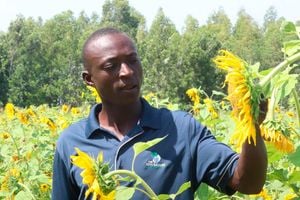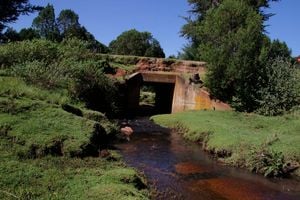How beekeeping has reduced forest fires and boosted Aberdares conservation

Some of the beehives belonging to Somar Self-Help Group in Umoja Mbuyu Village, Ndaragua.
What you need to know:
- Previously, many fires were started by illegal honey gatherers whose practices often involved burning to extract honey.
Beekeeping activities in strategic locations around Aberdare Forest have significantly reduced forest fires and contributed to environmental conservation while providing a steady income for local farmers.
This initiative has transformed the relationship between communities and the forest, turning a previously fraught dynamic into a sustainable and productive collaboration.
Years ago, fires were a recurring threat to the Aberdares, destroying vast tracts of forest and displacing wildlife.
One of the worst incidents occurred in 2019 at Kinangop Peak, where more than 100 hectares of bamboo forest were razed.
Another major fire was reported in Geta, Kipipiri Constituency the same year, with a similar trail of destruction. More fires in Shamata, Ndaragua Constituency, followed in 2020 and 2021.
However, in the past two years, no major fire incidents have been reported in the Nyandarua region of the Aberdares, thanks to the widespread adoption of beekeeping.
Honey production
The introduction of apiculture –bee keeping- in the forest has also dramatically increased honey production in Nyandarua County.
Annual output has surged from less than 500 kilogrammes to over 20 tonnes, prompting Nyandarua County government to build a honey processing plant at Ndunyu Njeru market in Kinangop.
John Gichuki, Nyandarua’s assistant director for Livestock Development, attributed this growth to the mutually beneficial relationship between beekeeping and environmental conservation.
“For beekeeping to thrive, conservation is essential. Based on the rising demand for beehives, we project that honey production could reach 50 tonnes within five years. This is a win for farmers as improved pollination from bees also boosts food production,” he said.
Nyandarua’s reliance on rain-fed agriculture makes pollination critical for crop yields. The county government has encouraged farmers to form groups, enabling easier access to training, resources, and support.
At Umoja Mbuyu Village in Ndaragua bordering Laikipia County, the Somar Self-Help Group is among the communities embracing apiculture. The group received 20 beehives in 2021 but initially faced challenges with bee absconding due to inadequate foliage.
“The situation improved after we introduced fodder crops like Sesbania trees, lupin and lucerne. Tree planting is gradually improving, the environment and conservation organisations have supported us with indigenous and avocado seedlings. Last year, we planted more than 10,000 tree seedlings on individual farms and public spaces with help from partners like Kiangure Springs Environment Initiative, Dedan Kimathi Foundation and the Kenya Forest Service,” said Somar Self-Help Group Chairperson John Ndiritu.
The group is among those set to receive honey harvesting and processing equipment from the county government, further enhancing their income.
Muthiga Assistant Chief Anthony Wamai said the introduction of beekeeping has eased his efforts to encourage environmental protection.
“Beekeeping has motivated the community to protect the forest, which they now view as a valuable resource. It’s no longer just about conserving the environment but also about creating a sustainable livelihood,” he said.
Beekeeping has also found favour with absentee landowners.
John Ndaire ,who manages 300 beehives near the Aberdare Forest, said the venture has turned illegal honey gatherers and charcoal burners into legitimate farmers.
“I manage beehives for seven absentee landowners. With the Aberdare Forest providing foliage throughout the year, farmers harvest honey three times annually. Those who previously raided the forest for honey or engaged in charcoal burning now find beekeeping safer and more reliable,” said Mr Ndaire.
The involvement of the local community has also addressed one of the main causes of forest fires. Nyandarua Kenya Forest Service Conservator John Njoroge noted that many fires were started by illegal honey gatherers whose practices often involved burning to extract honey.
“By involving the community in legal and sustainable beekeeping, we have drastically reduced fire incidents,” he said.
To further enhance beekeeping, the Nyandarua County government has launched a Sh26 million apple-planting initiative. Apples, which flower two to three times annually, complement the region’s tree-planting efforts and provide additional forage for bees.
“Our experts found that apples are ideal for supporting beekeeping while meeting our tree-planting targets. While we cannot meet the high demand for beehives, we have trained young entrepreneurs to make commercial hives, enabling farmers to place individual orders. This is creating business opportunities and promoting conservation,” said Governor Kiarie Badilisha.
The beekeeping initiative is not only reducing forest fires but also transforming the socio-economic landscape of the region.
Communities that once viewed the forest as a resource to exploit now see it as a partner in sustainability.





